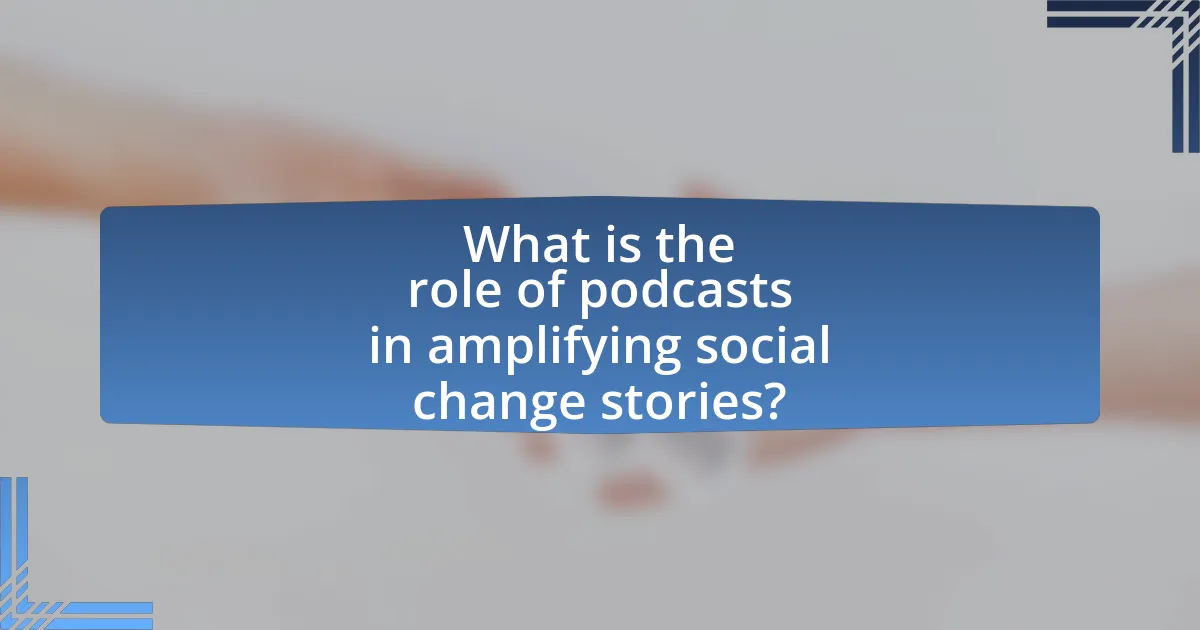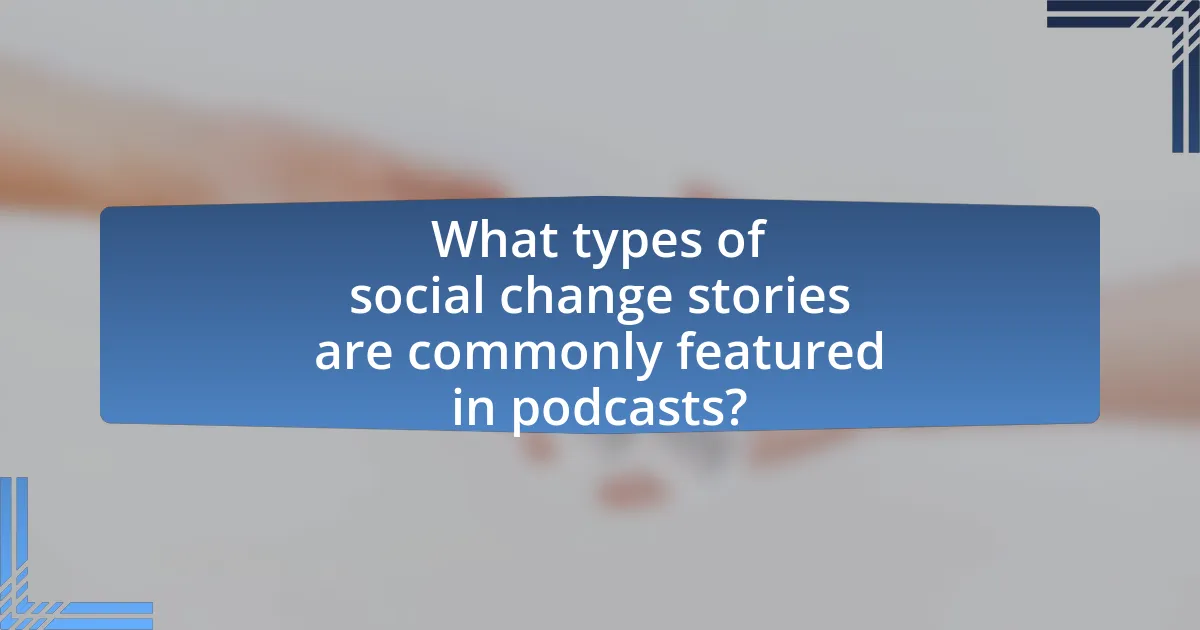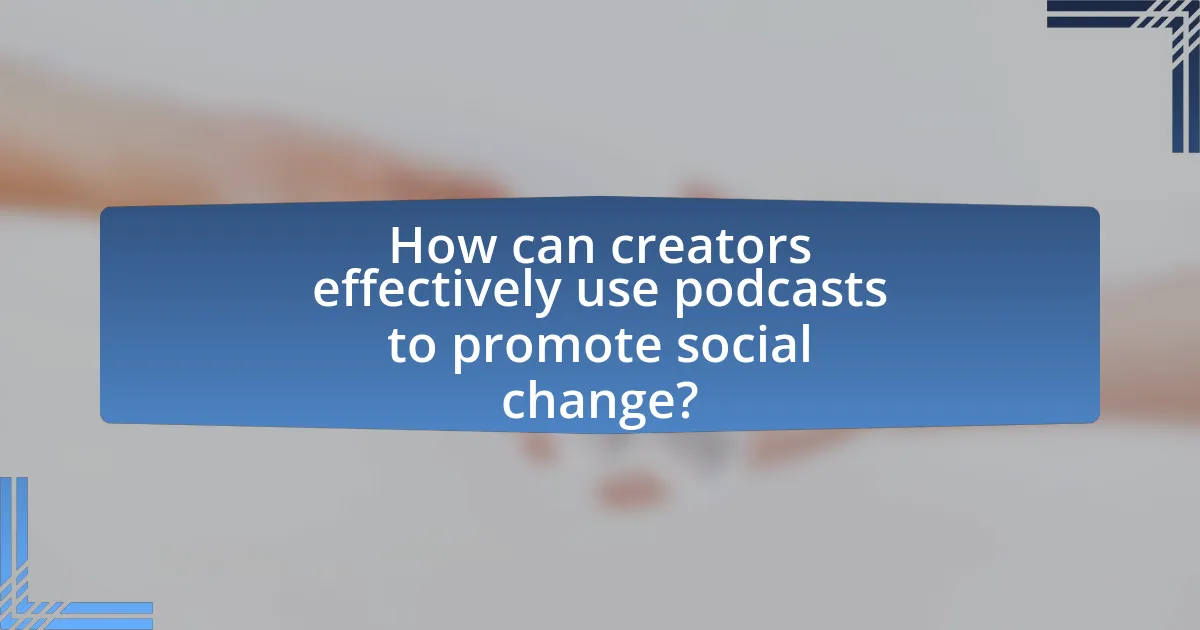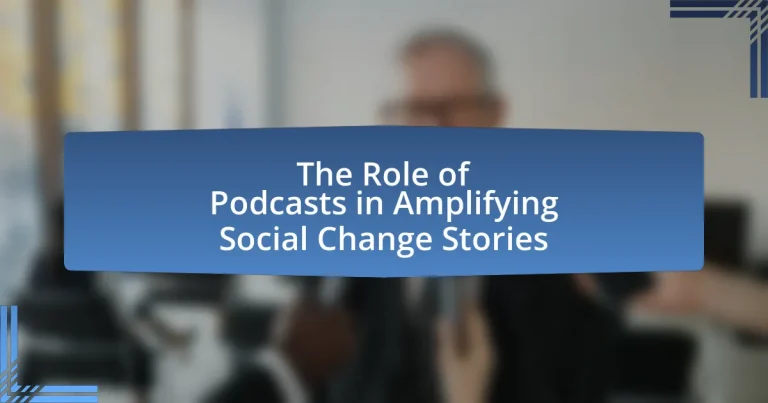Podcasts serve as a vital platform for amplifying social change stories by providing a space for marginalized voices and facilitating discussions on pressing social issues. They enhance storytelling through accessibility, intimacy, and community engagement, allowing listeners to connect emotionally and intellectually with diverse narratives. Research indicates that podcasts effectively raise awareness and inspire action, particularly among younger demographics who prioritize social justice topics. The article explores the unique features of podcasts, the impact of guest speakers, and best practices for creators to ensure accuracy and sensitivity in their storytelling, ultimately highlighting the significant role podcasts play in promoting social change.

What is the role of podcasts in amplifying social change stories?
Podcasts play a crucial role in amplifying social change stories by providing a platform for marginalized voices and facilitating discussions around important social issues. They enable storytellers to share personal experiences and insights, which can foster empathy and understanding among listeners. For instance, according to a 2021 report by Edison Research, 41% of podcast listeners feel that podcasts help them understand different perspectives on social issues. This accessibility and engagement can mobilize audiences, raise awareness, and inspire action, ultimately contributing to social change movements.
How do podcasts serve as a platform for social change narratives?
Podcasts serve as a platform for social change narratives by providing accessible and diverse storytelling that amplifies marginalized voices. This medium allows individuals and communities to share their experiences and perspectives on social issues, fostering empathy and understanding among listeners. For instance, research by the Pew Research Center indicates that 55% of Americans have listened to a podcast, highlighting its widespread reach. Additionally, podcasts like “Pod Save America” and “The Daily” have successfully raised awareness about political and social issues, demonstrating their effectiveness in mobilizing audiences for change.
What unique features of podcasts enhance storytelling for social issues?
Podcasts enhance storytelling for social issues through their accessibility, intimacy, and ability to create a sense of community. Accessibility allows diverse audiences to engage with complex topics anytime and anywhere, fostering broader awareness. The intimate nature of audio storytelling connects listeners emotionally to the narratives, making social issues more relatable and impactful. Additionally, podcasts often cultivate community by encouraging listener interaction and discussion, which can mobilize action and support for social causes. For instance, a study by Edison Research found that 55% of podcast listeners feel a personal connection to the hosts, which can amplify the urgency and relevance of social issues presented.
How do podcasts engage audiences in social change discussions?
Podcasts engage audiences in social change discussions by providing accessible platforms for diverse voices and perspectives. They facilitate in-depth conversations on pressing social issues, allowing listeners to connect emotionally and intellectually with the content. Research indicates that 75% of podcast listeners report feeling more informed about social issues after engaging with podcast content, highlighting the medium’s effectiveness in raising awareness and fostering dialogue. Additionally, podcasts often feature expert interviews and personal stories, which can inspire action and mobilize communities around social change initiatives.
Why are podcasts effective in raising awareness about social issues?
Podcasts are effective in raising awareness about social issues because they provide an accessible platform for diverse voices and narratives. This medium allows for in-depth discussions that can engage listeners emotionally and intellectually, fostering a deeper understanding of complex topics. Research indicates that 75% of podcast listeners report feeling more informed about social issues after listening to relevant content, highlighting the medium’s impact on awareness. Additionally, the intimate nature of audio storytelling creates a personal connection, making the issues more relatable and prompting listeners to take action.
What demographic trends indicate podcast listenership related to social change?
Podcast listenership related to social change is increasingly characterized by younger demographics, particularly Millennials and Gen Z, who show a higher propensity to engage with social issues through audio content. According to a 2021 report by Edison Research, 55% of podcast listeners are aged 18-34, a demographic that is more likely to prioritize social justice, climate change, and equality topics. Additionally, diverse audiences, including racial and ethnic minorities, are increasingly tuning into podcasts that address social change, with 36% of Black Americans and 29% of Hispanic Americans reporting regular podcast consumption, as highlighted in the same report. This trend indicates that podcasts serve as a vital platform for these groups to share and amplify their narratives related to social change.
How do podcasts compare to other media in promoting social change?
Podcasts are increasingly effective in promoting social change compared to traditional media due to their accessibility, intimacy, and ability to foster community engagement. Unlike television or print media, podcasts can reach diverse audiences through various platforms, allowing for niche topics and underrepresented voices to be amplified. For instance, a study by Edison Research in 2021 found that 57% of Americans have listened to a podcast, indicating a growing audience that is receptive to social issues discussed in this format. Additionally, the conversational nature of podcasts creates a personal connection between hosts and listeners, which can enhance empathy and understanding of social issues. This unique engagement is supported by research from the Pew Research Center, which highlights that 64% of podcast listeners feel more connected to the topics discussed, thereby increasing the likelihood of taking action for social change.

What types of social change stories are commonly featured in podcasts?
Podcasts commonly feature social change stories that include personal narratives of activism, community organizing efforts, and discussions on systemic issues such as racial inequality, climate change, and gender rights. These stories often highlight individual experiences and collective movements, showcasing how grassroots efforts can lead to significant societal shifts. For instance, podcasts like “Pod Save the People” focus on social justice issues, while “The Climate Reality Project” addresses environmental activism, illustrating the diverse range of topics that promote awareness and inspire action.
How do different genres of podcasts approach social change topics?
Different genres of podcasts approach social change topics by tailoring their content and format to engage specific audiences effectively. For instance, narrative podcasts often utilize storytelling techniques to humanize social issues, making them relatable and emotionally impactful, as seen in shows like “Serial,” which explores criminal justice reform through compelling narratives. In contrast, interview-based podcasts, such as “Pod Save America,” focus on discussions with experts and activists, providing in-depth analysis and actionable insights on political and social issues. Additionally, educational podcasts, like “TED Radio Hour,” disseminate research and innovative ideas, fostering awareness and understanding of social change topics through expert presentations and discussions. Each genre employs distinct methods to raise awareness, provoke thought, and inspire action, demonstrating the versatility of podcasts as a medium for social change.
What role do narrative styles play in conveying social change messages?
Narrative styles play a crucial role in conveying social change messages by shaping how stories are perceived and understood by audiences. Different narrative techniques, such as first-person accounts, non-linear storytelling, and emotional appeals, can enhance engagement and empathy, making complex social issues more relatable. For instance, research indicates that personal narratives can significantly increase listeners’ emotional connection to social issues, leading to greater awareness and motivation for action. A study by Green and Brock (2000) found that narratives can transport audiences into the story, fostering a deeper understanding of the social change being advocated. Thus, effective narrative styles are essential for amplifying social change messages in podcasts and other media.
Which social issues are most frequently addressed in popular podcasts?
Popular podcasts frequently address social issues such as racial inequality, mental health, climate change, gender equality, and economic disparity. These topics resonate with audiences and are often explored through personal stories, expert interviews, and discussions that highlight systemic challenges. For instance, a 2021 survey by Edison Research found that 54% of podcast listeners engage with content related to social justice, indicating a strong interest in these critical issues.
What impact do guest speakers have on social change podcasts?
Guest speakers significantly enhance social change podcasts by providing expert insights and diverse perspectives that enrich the content. Their participation often brings credibility and authority to the discussions, which can engage listeners more effectively. For instance, a study by the Pew Research Center found that podcasts featuring guest experts tend to attract larger audiences and foster deeper conversations about social issues. This engagement can lead to increased awareness and mobilization around specific causes, demonstrating the vital role guest speakers play in amplifying social change narratives.
How do personal stories from guests enhance the message of social change?
Personal stories from guests enhance the message of social change by providing relatable and authentic experiences that resonate with audiences. These narratives humanize complex social issues, making them more accessible and emotionally impactful. For instance, research indicates that storytelling can increase empathy and understanding, as evidenced by a study published in the journal “Psychological Science,” which found that narratives can significantly influence attitudes and behaviors regarding social issues. By sharing personal experiences, guests can illustrate the real-world implications of social change, thereby motivating listeners to engage and take action.
What criteria are used to select guests for social change podcasts?
Guests for social change podcasts are typically selected based on their expertise, personal experiences, and ability to engage audiences on relevant social issues. Expertise ensures that guests provide credible insights, while personal experiences can offer unique perspectives that resonate with listeners. Engaging communication skills are crucial for maintaining audience interest and effectively conveying messages. Research indicates that podcasts featuring guests with compelling narratives and established credibility tend to attract larger audiences and foster deeper discussions around social change topics.

How can creators effectively use podcasts to promote social change?
Creators can effectively use podcasts to promote social change by leveraging storytelling to engage audiences and raise awareness about critical issues. By sharing personal narratives and expert interviews, creators can humanize complex topics, making them relatable and compelling. Research indicates that storytelling in podcasts can increase listener empathy and understanding, which is essential for driving social change. For instance, a study by the Pew Research Center found that 64% of podcast listeners feel more connected to the issues discussed, demonstrating the medium’s potential to influence public perception and inspire action. Additionally, creators can collaborate with activists and organizations to amplify their messages, ensuring that diverse voices are represented and heard.
What strategies can podcasters employ to reach a wider audience?
Podcasters can employ several strategies to reach a wider audience, including leveraging social media platforms, collaborating with other podcasters, optimizing for search engines, and engaging in targeted marketing. Utilizing social media allows podcasters to share episodes, interact with listeners, and create a community around their content, which can significantly increase visibility. Collaborating with other podcasters can introduce their shows to new audiences, as cross-promotion exposes each host’s followers to the other’s content. Optimizing podcast titles, descriptions, and show notes for search engines enhances discoverability, making it easier for potential listeners to find the podcast. Additionally, targeted marketing through ads on social media or podcast networks can effectively reach specific demographics interested in the podcast’s themes. These strategies are supported by data indicating that podcasts with active social media engagement and cross-promotional efforts tend to have higher listener growth rates.
How can social media be leveraged to amplify podcast messages?
Social media can be leveraged to amplify podcast messages by creating targeted promotional content that engages audiences across various platforms. By sharing episode highlights, quotes, and behind-the-scenes content on platforms like Instagram, Twitter, and Facebook, podcasters can attract listeners who may not be aware of their show. Research indicates that 54% of podcast listeners discover new podcasts through social media, demonstrating its effectiveness in reaching potential audiences. Additionally, utilizing social media advertising can further enhance visibility, allowing podcasters to target specific demographics and interests, thereby increasing listener engagement and expanding their reach.
What role does community engagement play in podcast success?
Community engagement is crucial for podcast success as it fosters listener loyalty and enhances content relevance. Engaged communities provide feedback, share episodes, and create a sense of belonging, which can lead to increased listenership and word-of-mouth promotion. Research indicates that podcasts with active listener communities often experience higher retention rates and audience growth, as seen in the success of shows like “My Favorite Murder,” which built a dedicated fan base through social media interaction and live events. This engagement not only amplifies the podcast’s reach but also enriches the storytelling by incorporating diverse perspectives from the community.
What best practices should podcasters follow when addressing social issues?
Podcasters should prioritize accuracy, sensitivity, and inclusivity when addressing social issues. Accuracy involves thorough research and fact-checking to ensure that the information shared is reliable and well-supported. Sensitivity requires an understanding of the emotional weight of social issues, which means approaching topics with empathy and care to avoid further harm to affected communities. Inclusivity entails giving voice to diverse perspectives, particularly those from marginalized groups, ensuring that their experiences and insights are represented. For instance, a study by the Pew Research Center indicates that diverse representation in media leads to more comprehensive discussions and better understanding of social issues. By adhering to these best practices, podcasters can effectively contribute to meaningful conversations around social change.
How can podcasters ensure accuracy and sensitivity in their storytelling?
Podcasters can ensure accuracy and sensitivity in their storytelling by conducting thorough research and engaging with affected communities. Thorough research involves verifying facts, using credible sources, and cross-referencing information to avoid misinformation. Engaging with affected communities allows podcasters to gain insights and perspectives that enhance the authenticity of their narratives. For instance, a study by the Pew Research Center highlights that 64% of podcast listeners value accurate information, emphasizing the importance of fact-checking. Additionally, sensitivity can be fostered through careful language choices and by avoiding stereotypes, which is crucial in representing marginalized voices respectfully.
What ethical considerations should be taken into account when discussing social change?
When discussing social change, ethical considerations include the representation of marginalized voices, the accuracy of information presented, and the potential impact on communities involved. Ensuring that marginalized groups are authentically represented prevents the perpetuation of stereotypes and promotes inclusivity. Accurate information is crucial to avoid misinformation, which can lead to harmful consequences for those affected by social issues. Additionally, considering the potential impact on communities ensures that discussions do not exploit or harm individuals, but rather empower them. For instance, the 2020 report by the Pew Research Center highlights that 63% of Americans believe that media representation can influence public perception of social issues, underscoring the importance of ethical considerations in discussions surrounding social change.
What resources are available for aspiring podcasters focused on social change?
Aspiring podcasters focused on social change can access various resources, including online courses, community organizations, and funding opportunities. Platforms like Podcaster’s Paradise and Skillshare offer courses specifically tailored to podcasting for social impact, teaching skills from audio editing to storytelling techniques. Organizations such as the Podcast Academy and the Association of Independents in Radio provide networking opportunities and resources for podcasters committed to social issues. Additionally, grants from entities like the Knight Foundation and the Ford Foundation support projects that aim to create social change through media. These resources collectively empower podcasters to effectively share impactful stories and drive social awareness.


